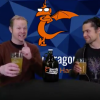By colby on 10/28/2016
We've been thinking about this for some time. A show about making things happen and the people who do it in an informal setting over a pint.
Here is our first episode, ever! Featuring David Cleverdon with 360immersive.
Transcript below:
Jason: Welcome to our first ever edition of decision pints, a show about entrepreneurship and making things happen. Uh, we're, we're here at the studio of dtx creative and David clever and three 60 immersive and are about to talk and learn a little bit about some exciting things that he's been up to and was accomplished and uh, reasons for it. But really at first we'll talk about the show. Uh, it is about entrepreneurship, it's about short stories, motivating people, telling stories. And ultimately we want to keep it to be a quick show about the duration of the time it takes to drink a pint of our favorite local beverages here. A featured on the show today. We picked up from pre funk. We have a, that means Blood Orange Rustler IPA,
David: huh?
Jason: Oh look at that. Yeah. OK, well we're working out the camera situation. Great. And now that we figured out which camera. Thank you pre-fund. Thank you. Rustler. And thank you David, who forgot to turn off their phone. So starting out, I'm going to give a little bit of a biography, uh, for David here of just things that I know, I know he's always been an achiever, he's an engineer, he's an innovator, he creates things and makes things happen sometimes with a, with a macgyver type skills, even going back to early stories of in high school building a jet engine and a wanting to run that car up. It was in a, in a, but more than that, a pilot, an innovator entrepreneur with multiple companies, but always doing things, accomplishing things and leading the community. So thank you very much, uh, for, for being here. I'm well, thank you. Thank you for promoting the show. And, and we know this is an inaugural m, a livestream. So there may be a few little things, uh, that, uh, don't expect a lot of Polish effect. We're drinking beer onset and great. Well with that. Ah, cheers to do and do you at home and at the office.
Jason: So tell me a little bit about the name decision pint. I'm intrigued with how you came up with that name. Spent a lot of time as an engineer and maybe have too much time in front of the computer or home alone, isolated and started thinking about what is it that motivates people to do things to make things happen. That's, that trigger difference behind sitting there thinking, wow, somebody should invent this, or wow, I should go and build a drone. And somebody actually just doing it and accomplishing it and being successful with it. And I thought that's one contribution I can make [inaudible] I'm always excited about those things. And really it's a play on from the uh, George Bush a memoir. It's called decision points. Ah. And, and I just thought the name sounded like a good fit for what we were trying to accomplish and, and fitting it into the, the small duration of a web show that we feel is important to let people free up their time, but motivate them and inform them of exciting things that are happening.
David: So the, the idea behind decision pie is that you have a discussion literally in the time that you can drink a beer. Yes. That's the whole idea. Absolutely. Awesome. Awesome. I mean, that fits into the whole world that we live in today.
Jason: Great. So in that, ah, let's turn the tables and what motivated you to get started? Um, I mean, you've had multiple companies and, and let's, let's hear your thoughts on taking that first step.
David: Oh, I'd never recommend anybody doing this. Um, you know, you have to have, you have to want to do your own. Could Start Your own company and you do it because I can't tell you why people would do it. I can tell you that there's something about being able to control your own destiny about building your own castle and, but Moreso when you're looking at technology, when you're looking for instance on, you know, we were probably one of the first folks in the, in the area to build a drone and actually get into that and it's been three and a half years now that, uh, we're actually fully commercial license to fly within within the airspace. And, and, uh, the, our new initiative which is [inaudible] immersive about immersive training and marketing using virtual reality and augmented reality. And that's why we have these goggles up here.
David: It allows you to kind of control your own destiny where if you're working for a company and it may be a great company, but you're still being directed by somebody else's vision and in, in to be an entrepreneur or entrepreneur, you, you really want to have your own vision. And, and, and it, it just, it, it's long hours and really, you know, flipping hamburgers a lot of times is more than I make. And, and, uh, but you can say I've done this and that's important. And, and from your standpoint, you've done that same thing. You've walked down that same path.
Jason: Yeah, it's an exciting world where you can take on the risk, uh, and, and participate in the upside. And that's always been appealing. And uh, it's not the easy route and it may not even be the more lucrative route in most cases, uh, but, but it is certainly rewarding in and of itself. And is thinking of that. What was it like as you get started, you know, when did you really see that, hey, we can actually make some money in urban living in and actually do this successfully?
David: Well, I'd like to take a moment, not necessarily with dtx creative because that's been in existence for 15 or 16 years, but to talk about three [inaudible] a immersive, it's a brand new, uh, initiative. It's really focused on a new technology of a immersive, uh, both marketing and training and it uses this type of technology to help people feel connected to mostly a situation awareness. It can be a product demonstration. It can be in a, for instance, a, a circumstance where we're training law enforcement or training first responders or ems or medical and it's brand new and why do we love it? Because it's an opportunity to be almost [inaudible] not only in Boise or in Idaho or in the region, but you're, you're almost first and doing things on a national, international basis. And that's something that comes around once in a lifetime. Those are the important things.
David: Is it, is it a grind? Absolutely. Because you've got to, you've got to introduce it, you got to teach people that this is a better mouse trap using this can actually, um, for instance, we were talking to an organization today that he was talking about just one initiative that could save 15 minutes of training that if you looked at it over the amount of personnel that they have that's over $10,000 a year every year that they use the process. That's a lot of money and it's literally something that you can hold in your hand. You put a smartphone in and suddenly you're there, you're in there in a hazmat situation, you're in there. And a pediatric trauma in a cardiac circumstance, in a, a threshold evaluation for instance, for law enforcement. You are there and you can learn and you can train a exciting. So
Jason: the virtual reality scenario, I mean you jumped in full force and I think you might own every headset that they've ever made. I think every technology that's come out has come across your desk, seen several camera rigs and capturing video of seeing motion capture, a computer simulation and graphics driven. What's it like to really think that, wow, there's this new technology, it looks pretty good and then all of a sudden have this major investment in all these different technologies, putting them together. Where in your case you're not just buying off the shelf components, a lot of times you are building your own or piecing together solutions to make them better and fit.
David: You don't sleep much, you, you, but you have to do all that. You. When we built a camera rig, we uh, we take, we off the shelf components and we mix them and match them and, and there's a poxy glue involved and there's carbon fiber involved. It's something that you can't go by. So what's your alternative? You have to build and you have to build it to what you know that you want it to be, not somebody else. So you can, you can do that. Um, we have two camera rigs. We have a bunch of [inaudible] camera rigs. We have six camera rig, we have a 10 camera rig and we have a 16 camera rig. Frankly, we use mostly the four camera rigs. They give us a good combination of, of quality resolution, low parallax errors, which are called stitching errors and, and yet a light rig that we can move around and we can put in a, a car we put in a patrol car, we can hang from a helicopter, we can hang it from the drone, that and it, it's just a real versatile rig and it allows you to create content that you normally probably couldn't create. We, if we were running all 16 camera rigs, we couldn't put three cameras in that through camera rigs and a scene in this case. We can't.
Jason: Yeah. And it's, it's just amazing to see that you think, OK, well you're going to capture three 60 video, you're going to, uh, work in a vr environment or you're going to, you know, deploy apps that contain part content, part generated a simulation equipment and integrating with other systems. And at each layer there's so much complexity that almost gets glossed over as, as being simple. Like the stitching errors alone impresses me to think you capture from all these cameras and you're able to put them together and work. And, and I can't see any easy part of that other than hours and hours of drudgery of working to figure the right solutions. And, uh, I, I, it's exciting to see it being worth persevering through to the end so that you do have that incredible expertise across all the different types of ways of a video contraption and capture system. So we're seeing a lot of that. Even facebook releasing cameras that will capture the video video.
David: Here's the thing that I get excited about. You mentioned apps, you know, going out and capturing a three-sixty experience. We don't call him even videos, their experiences because that's truly what you do. You're in that moment, you're in that experience, but when you, when you can go out and that you can capture a number of experiences that, for instance, or in a pediatric trauma course, and then you can add interactivity and you can add secondary content. So the big picture is that experience, but maybe you want to see a little detail of how a certain process or procedures done we can roll out in that immersive experience to diy content. So we can show that detail, roll it back in, and then you go on with your immersive experience for that particular course module. This is all done by APP basis. Literally on your phone.
David: We have testing strategies. We have review points all driven by an lms that frankly your company is building and we're very happy about that. And uh, that ability to literally send somebody an APP with a smartphone and a $35 headset allows us to distribute and an extremely low cost. And there's two real main reasons why somebody wants to consider immersive training. Number one is a connection to the content so that your retention goes up, the attention span goes up and ultimately the training is successful, but Moreso your costs go down because you can distribute that training. And so they can use it as a preliminary precursor to actually live training. And then they continually review it, review it, and review it. When we actually had a situation with the Idaho state police where we had a pit maneuver training app showed how to, uh, how to flip a car, you know, a high speed chase and they want to stop it in all the previous years when the new recruits come out, they, they go through the process and the, the, uh, cars get damaged, you know, they're going to go to the body shop, they fixed them up and the cars get damaged. In this case, they took the headsets like this, all the recruits practice virtually and practice virtually develop that mental muscle memory. Not One, a car was damaged. They of course body guys weren't happy but not one car was damaged. And that's a great data point to be able to allow us to understand that immersive technology and training actually works. Wow, that's amazing.
Jason: Exciting stuff. And it's so early on, it seems like you've got to educate people as to how it can be a utility to help them. So what was that process like coming from maybe looking at Vr, the technology, the opportunity, and then actually getting customers, uh, is it as easy as, hey, look, we do some Vr, uh, and they're excited, or is there a lot of education or, and innovation around how to leverage that for their needs?
David: Here's the, here's the thing we've come to understand when you, you're talking to somebody perhaps over the phone, you say, we have virtual reality training. There are a little standoffish, it sounds a little bit like star wars or star trek or science fiction. You can talk about immersive training, you know, which is really all encompassing. But we know one thing is that it's if training professionals, if the people that train for living will put on a set of these, uh, goggles put on a headset and they look at training content, we don't have to say a word, they're sold. Now, budgetary considerations come into play. A lot of different things come into play about actually doing a project, but they are sold on the technology and it's been almost universal cause
David: you can see it, you can understand it's a better mouse trap.
Jason: that's great and it's exciting and motivating staff to see all of the activity, all the places you go base jumping, a rafting, a list goes on and on. Kayaking. We're just exciting stuff coming out of [inaudible]. Immersive ballooning was our last little adventure. I can't wait to see the videos after this afternoon. So. So from there, I mean you've mentioned you've been in, in a, in business for almost two decades and what do you attribute that to sustain success being a in business through all the trying times, economic downturns, changes in technologies and marketing. What do you attribute your success to?
David: Well, I think substained is there. I think tenacity is there on the questioning word success, but I think all of that is there. Um, it's really grinding it out. You know, the, the great recession was, was really tough for all marketing companies, all folks that do production and content creation for a living and uh, you just got to stay with it. We, we talk about being all in on an under this immersive technology and truly we're all in. This is where we're, we're staking our claim. Immersive technology is going to be where we are going to be. We're not giving up what the traditional, uh, the video production and APP development and web development, but that's going to all roll into what we say see as the future, which is right here. Awesome.
Jason: Well that's great. So flipping that on its head a little bit. I mean, you, you've done a lot of things and what are is an example or some examples of things that you tried and you thought this is going to be huge, but yet it just didn't turn out the way that you expected. Digital signage
David: really early in the digital signage market. We, uh, we had a great client with a Boise state and we've put up a lot of panels. It was just a little too soon. We were ahead of the curve, um, where we had a hardware promotion, uh, we were just a little bit ahead of the curve on it and sometimes that happens, you, you see something, you can understand how it can affect people and how it
Jason: great. So our apologies, uh, technical difficulties. The audio ran out of batteries as back in business and being the first show we actually are proud to have a little bit of a bump so we can find things to improve who really would want to be just perfect the first time. It's helping the viewers who have busy lives and need to do other things besides listen to the captain could have gone and taken a polybag, got a beer, any number of things, but it hasn't wrap up. I mean, we, we, we talked about a lot of things about virtual reality, about starting a business, running a business, the grind about digital signage and having high expectations being early on and maybe too early, uh, and, and just impressed by all the things you've done and certainly appreciate the opportunity to work with you and have you here and talk.
Jason: A, I think as far as an endorsement a goes at the end of each show, I'd like to give an endorsement and they're relevant on the kind of guy who a Hashtag kind of guy who and for David cleverer than a, I think there are so many good heartfelt warm things that I would like to say, but adding in humor, I would like to say David cleverer than the kind of guy who would order a silicon breast implant online to stabilize a camera gambled to get a perfect drone shot video footage. I think that's something innovation, finding cost effective solutions, engineering, building things, and ultimately with the goal of producing better products and better solutions for the task at hand.
David: And you know, that's a very true story and not only did it, it actually worked, but it was very cost effective. So, uh, we'd like to invite you back Wednesday sometime in the afternoon when we figure out the, uh, the schedule for this show and just come back to us. We know that there's five pacemakers
Jason: followers right now. I think my mom's 20 percent of our facebook audience. Hi Mom.
David: Um, anyhow, I'd like to thank Jason for promoting the, uh, the idea of decision pint and we look forward to the next segment of the next show. Right. Thank you very much.
David: I.










